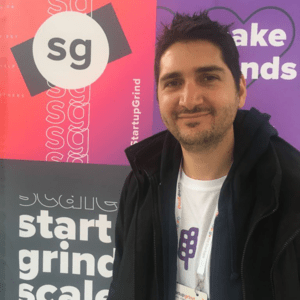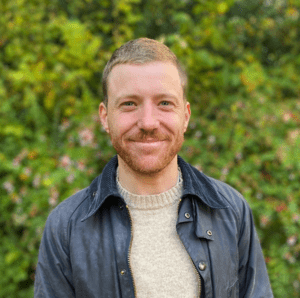They call him Positive John for a reason, so much energy and enthusiasm and full of super helpful advice”. I worked in the dynamic environment of growth agencies and fast-growing product startups. The marketing journey started with analytics and applied statistics for conversions and grew up to Growth Experiments, my field of expertise.
How GrowthMentor almost went bankrupt
Listen on:
About this podcast
This episode was supposed to be just a test run to just see how the process would go. Questions weren't prepared in advance, and there might be a bit of roughness around the edges. But after recording it, we decided it's "good enough," so here it is!
What we talked about
- Playing the role of the growth psychotherapist on GrowthMentor calls
- Focusing on tactics before foundational things like value proposition clarity
- Most challenging event GrowthMentor endured (almost going bankrupt) and how it was surpassed
- Mentee profile pages, what we're currently working on, adding social network elements to GrowthMentor
- Approaching questions to ask while designing product onboarding UX flows
Transcript
Positive John: All right, so how’s it going, everyone? I’m your host today Positive John. This is episode number zero trying this out and to new EP Foti Panagio. Growth mentors CEO. If we’re ready Foti hit me with the jingle. I really expect we have a jingle for this. But first starting this a little different. We’re gonna do some icebreaker. We’re not sponsored, but we should best self. Foti, have you had your 15 minutes of fame yet?
Foti: Uh, no, not really from random. Nothing that rings a bell. 15 minutes of fame.
Positive John: No Hollywood time for you just yet?
Foti: No.
Positive John: Hopefully growth mentor gets us there, then I then have my favorite minutes of fame yet. That’s good, some ice breaker for us to start. But yeah, officially First, we start by getting to know the mentor a little bit. So Foti tells us to tell us a little bit. How are you generally helping people from growth mentor community? Feel free to paint a picture with a previous session that you might have loved if it makes easier for you?
Foti: Sure. Sure, sure. So it’s super diverse. I mean, some people are marketers that probably were in the same position that I was in a couple of years back when I was starting off your VPS. Having just like a founder on top of them be like, yo, you know, we have to hit this target. And then then not really knowing exactly what to prioritize. And then there’s founders who are kind of probably we’re in love the position I was in maybe two years ago, when I was just launching Growth mentor, and I had these expectations. And then we launched and it’s Whoa, you know, this is actually a lot more difficult than than I thought it would be. But in terms of like cases, that that really stood out to me. One of them was with the Brazilian, and he was a founder, new founder used to be a developer, working full time as a developer. And then he made his own thing with a couple of co founders raised some funding around 70 $80,000. And they were just plateaued for the last two and a half years burned through most of the money at like $2,000, Mr are completely stressed out about his job and his position. And like he had this pressure that he should continue working on on the startup just because he had already started and they got the funding. And that’s kind of like what you’re supposed to do if this is better than being a full time employee. But just by talking to him and asking him what really makes him happy. Realize that what makes him happy is his development and just building building stuff. And he just couldn’t stand the stress of having to manage people, right and have to be like this boss type of guy. And through that call, it was kind of a breakthrough call for him because he kind of realized that he’s been killing himself the whole time. And he just doesn’t, it’s not for him. And he ended up selling on his share to his co founder and went back and became a freelance web developer just did what he loved. So like, there’s some transformative cause like that, where you can really make a difference just by asking questions, and getting people to say the things that are probably buried deep inside their subconscious mind. And they, they’re there. It’s like this whirlwind of thoughts and emotions. But you know, unless you actually have somebody ask you the questions to bring it up. You might not never really sparked that realization. So for me, like, I like to play the role of kind of the psychotherapist is asking questions. It’s more for me, like my favorite sessions are where I can I can kind of play the role of just that, that that sounding board, almost like a psychologist but like business growth psychologist in the sense.
Positive John: So I’m equaling a couple of the things that I listen, you saying and translating here in my mind, transformative sessions by making difficult questions, being the psychologist from the business side. This is one of the things I love from being a mentor in the platform. I usually say that my role is ends up being making the difficult questions, which is far from when you’re in a consultant position, working for the same business that you’re more paid to suggest them what to do next in growth mentor, you just fits this role of bringing difficult questions that might not be in their radar. And another something that you mentioned in the very beginning is this idea of people come to the platform sometimes full of ideas, but they don’t really know what exactly to prioritize anything that you can share from previous experiences, previous calls that you just you know, help steering the boat. Yeah, prioritizing better
Foti: plenty of times. I mean, this comes up all the time where people come to me and they say either I want to do link building. This is really popular because I have that on my profile is something that I’m very strong at, or performance marketing, Facebook ads, and then also, of course, AB test experimentations. And then I, the first thing I always ask is, what can you show me your website, please? So we’ll pull up the website. And many times it I just don’t really understand what their product does it develop, I think the biggest problem that a lot of founders have is they’re not their value proposition isn’t succinct, and it’s not coming out loud and clear. And if that it’s not coming out loud and clear, everything else doesn’t really matter. That’s more downstream sort of growth initiatives, you really need to nail your positioning and your messaging upfront, right. So like, that’s what I like to do sometimes is help people realize that they don’t need to jump into tactics straightaway. And sometimes it’s good to just take a step back. And think strategy like what what what product? Am I actually, what value Am I offering, first of all, right? Because like, a lot of times, people come with this mentality that, hey, I am not growing fast enough. So I need to do insert here thing that I wrote on a blog post. And I always asked like, Well, what do you have customers that you are providing value for right now? And if the answer is no, then that shouldn’t be growth isn’t really your priority. It’s finding product market fit, right? And that comes from by really talking to your users, and being clear and honest to yourself about what the problem is that you’re currently solving. Because if you’re not actually solving a problem, then what are we even doing over here? Right? Because like that’s, that’s what if that’s what people want to pay you for? And that’s it’s the it’s the give and take. It’s that reward mechanism, right? You call someone’s problem, they give you the money, and then you can you know, go on vacation to Thailand, you know, for coronas over. Right? But yeah, so that’s, that’s, that’s kind of the answer the long winded answer. Yeah.
Positive John: A couple bites that, again, I capture from this. And it’s expected, you know, from someone working in growing community, being customer centric from the get go. I like this idea of Okay, let’s be honest with the problem that we’re solving, right and avoid jumping into tactics, but also what you mentioned on let’s really understand what is positioning and what’s messaging, because other than that, we might be just making two downstream decisions that it’s so down into the tactical levels, that the big starting points, the phone the ground, right there, the groundwork? Yeah, not covered. Yeah, it’s just great. And, you know, we expected to listen all that from you. I want to jump into the get into the specifics. Our next section here. So starting with the big challenge question, and I’m going to bring focus to growth mentor, as a product that you’ve been growing for the past couple of years, I want to say. So within growth mentor, what was the most difficult challenge that you went through? And how did you make the moves and nudged people and processes in the right direction to get it solved?
Foti: The biggest problem that we had ever in life and growth mentor was almost going bankrupt, around like a month after we launched, because we, we didn’t have any way to make money monetized because it was a marketplace. And anyone could create an account for free. And most of the mentors are offering the time for free. So because our monetization was commissioned, like we weren’t making any money, because free calls 15% of zero is zero, right? So like how we did that was, how we tackled that problem was quite simple. We just put a subscription gate on front of it, did a lot of user calls before and ask people like, Well, you know, you got value out of this, how much would you pay for this? Right? And a lot of people were saying some crazy, exorbitant numbers like $1,000 $800 on, but I didn’t, you know, I, I generally don’t take those things seriously. Because they’ll, they’ll tell you, whatever they want to say to make you feel good on these users. I was like, I’ll pay all this money, but when it comes down to it, like they don’t so we started with a low amount $99 per year, we put the subscription Game on. And at this point, as I said, we were almost bankrupt. I hadn’t paid my rent in two, three months, and my developers in four months and I owe them $20,000 just being honest with you, right? And I’m like, that’s, you know, please hook me up. One last thing one more month, build the gates, he Oh, in less than. Pay. I’m not gonna do any more work. No. And this is right after we end. This was right after we had come back from San Francisco from Startup Grind. And they had seen us spent $10,000 to fly the whole team to SF. And like, they were probably thinking we didn’t really tell me this, but I can imagine that macek was like dude, you’re spending all this stupid money flying over there. You’re not making any money. You’re not paying us like how can I trust you? You know, like, dude, please trust me on this. So they built it out the last epic before and then you know, we launched it and immediately people started signing up because the value was already there. We had the social proof and we started making our first little micro payments to them and I paid my angry landlord and everything was up from there. But, you know, that, for me was the biggest challenge was just that personal thing of convincing people that, you know, they didn’t have to keep going, but like really explaining the vision and like what I’m doing and telling them on on on that, right. So that that was because everything afterwards was just, you know, simple sort of like growth stuff, you know, because once you face this thing of like, you’re almost bankrupt, like everything afterwards is easy. So like, that’s why I picked up on this one.
Positive John: A quick follow up before I do a step back and see the product growth in the multiple steps that I just captured here. How did the team feel? It’s nice, how you how you bring this perspective that the team just saw all the money spent in a trip to San Francisco, which by the time wasn’t something very cheap. So people can make the calculations in their, in their minds, how did the team feel? And after you selling again, the vision of what your you guys were all up to? Were you able to keep the same team moving forward?
Foti: Well, I didn’t really have that big of I mean, it was just me and Jessica as the core team. At that point, I didn’t have any employees. And my developers were third party, software house based in Poland. So we had met them, we had that personal relationship, we flew up and we got drunk together in Poland, the first time. So like, we had that sort of relationship. And Macek, the CEO over there, he was Jessica, student, English student for five years before we started working together. And so like we were kind of we knew each other for some time. So it I guess, to answer your question, we didn’t really have a team. It was just me, Jessica, and those and that’s all for house. And the vision and the vision now, which
Positive John: that is awesome. So doing just one step back the way I see, like you described initially that the big challenge was a monetization challenge. And it’s nice, you know, right. Now, after some experience in different products, it’s usually, okay, a product is solving for product market fit, where retention is the number one concern, then it becomes acquisition, how do we develop the multi channel strategy? And the last piece of the puzzle if we’re ready, raising funds, and managing money in that way? Okay, how do we turn it back? And start with how do we figure out monetization for the product? Right, so I was able to see a couple products going through those three pieces of the puzzle. Right. So retention, acquisition, monetization, really nice. You bring the very last piece, giving us some visibility of how is this for growth mentor?
Foti: You see, we were bootstrapped. Right. So it’s like, right, we didn’t have runway, so we had to fix monetization from from the from much earlier than a lot of other startups. Mm hmm.
Positive John: Which is usually what happens, right. So if you’re not raising in early stages, you really need to figure out when to zation a little earlier in the in the process. That’s, that’s great. I’m pretty sure the listeners would benefit from having this in mind. I want to start wrapping up soon. And we close this talking about the future. Share with us, the listeners, whoever’s watching us one exciting project that you’re currently involved with, Foti.
Foti: the project that I’m super excited about right now is the mentee profile pages and the social network element that we’re going to start slowly rolling out. Because one of the things that’s happening with growth mentor is the mentor, the mentors are giving so much of their time, and they’re helping people. And that is contagious. So if you’re helped by somebody, there’s this thing called reciprocity where you want to give it back. And there’s very little that the mentees can do to give back to the mentors besides writing a review. So like, what we want them to do is to give back by helping somebody else. So I’ve mentored someone and I’ve paid it forward, now you go forth, and pay it forward and help somebody else. So how can we continue that chain of giving and helping and and and, and, and yeah, and that’s that’s what we want to do with the social network by allowing mentees to book calls with other mentees who are in needs. So the help request functionality that we currently have now that’s going to be extended to mentee so that mentees can also apply to these help requests and say I can help you and I’ve been in similar situation. So that’s that’s the next big thing.
Positive John: Okay, two things that I went to eco back, add some some thoughts there. love to listen, reciprocity, one strong behavior psychology principle from Chobani. There’s nothing more positive than reciprocity itself, and also bringing this idea. Okay, so you’re involved in this excited, exciting project of developing the social side of growth mentor, and you’re starting this with allowing users to create profile is that I understand that correct. Yeah, yeah, totally. That’s super interesting, because in this in the growth Story of LinkedIn. This was one of the acquisition loops that they started back in the days allowing users to create profile because those profile pages count as user generated content. This is indexed by Google. And this right over time becomes more visits, because people are just finding those now indexed pages. So I really hope to talk to you a couple months from now, after all these pages are indexed by Google and see the growth in traffic just coming out of this initiative, very awesome. Share with us one thing that you’re learning or currently trying to learn.
Foti: Right now one of the things that I’m trying to learn his principles of UX for onboarding for product onboarding. And we’re trying to figure out what questions to ask on the intake form when someone creates an account. And one of the big takeaways I had today from just my own little study, and I spent like an hour and a half reading some blog posts is, is just being very intentful, with what things you’re adding, don’t not necessarily be scared of friction, but be scared of asking questions without giving any indication to your users of why you’re asking, and how the answer to that question is going to help them make better use of your products. Right? So like, if you’re asking things like, what is your gender? Or how much revenue does your company make? Or how big is your team size? How does that how does that what does that matter to the to the product experience that they’re gonna have, right. And if you can somehow explain that you can add an incredible amount of friction to the onboarding process. And in a justified kind of way, which is, you know, the more data you collect, obviously, like, the more powerful that is, because you can then do better segmentation later on, and create cohorts and so on. So like, that’s, that’s currently what we’re working on. Because we’re refactoring our entire onboarding process right now.
Positive John: That’s outstanding, I wanted to add a little bit to that discussion, I had a chance to participate in two different onboarding revamp processes, one in bringing me in one thing that stuck to my mind was having this product designer, explaining to us why onboarding, this idea that the user before they really understand your product, the experience, the value proposition, they have their aha moment, they’re in a complete different mindset about what your product is, and what value they can extract right within the onboarding is really this set of steps that set them up for success, it’s really holding hand and guiding them through to first experience the value proposition, what meets the promise of your product, and allowing them to create the habit from that point on. But from that, I wanted to understand any specific reason why this became a niche initiative for you and became something that you’re trying to develop UX for onboarding as soon as you can share with us.
Foti: I mean, it really ties down it’s really ties back to the to the previous question, you asked about what the next feature is that we’re building. We’re building the mentee profile page. So we’re going to be showcasing information on the mentee profile page, that currently we’re not collecting that data from right on the onboarding process. And we wanted to make it as seamless as possible so that when somebody creates an account, their profile pages are already pre populated with that information so that we don’t have to, then after they create an account, oh, by the way, now, please also fill this information in as well. Right. So that’s kind of why this why we’re we’re rethinking
Positive John: that. That’s really nice. When a close that onboarding topic with in in the projects that I participated at least a couple set of experiments that I ran specific towards improving onboarding, he was the best set of variables that correlated to long term retention, increasing onboarding, really improved our retention curves over time, like week two retention. Expect to again be talking to you a couple months from now and listen that we have more retention rate into product just out of onboarding practices and tactics, whatnot. This is great. Foti tells us apart from growth mentor, how can people and listeners reach out to you?
Foti: they can send me an email at Foti F-O-T-I @growthmentor.com. They can find me on LinkedIn or Twitter.
Positive John: That’s awesome. Foti I really appreciate we’re 20 minutes in this number zero podcast growth podcast. Once again, today we had Foti, growth mentor CEO, make sure to reach out connect and be social. And if you feel like you can get more value by talking to Foti. Just get to growth mentor. Get him on a chat. Don’t suffer alone. grow with a mentor. That’s it, everyone.
In this episode


As VP of Growth at EuroVPS, I had to make a LOT of decisions, daily. This got exhausting, especially if I had multiple good ideas on how to do something, but wasn’t sure which to choose. Moments like these inspired me to build GrowthMentor. Does this resonate? If so, I’d love to try and help you.
Join the community
Enjoy the peace of mind that advice is always only one Zoom call away.



